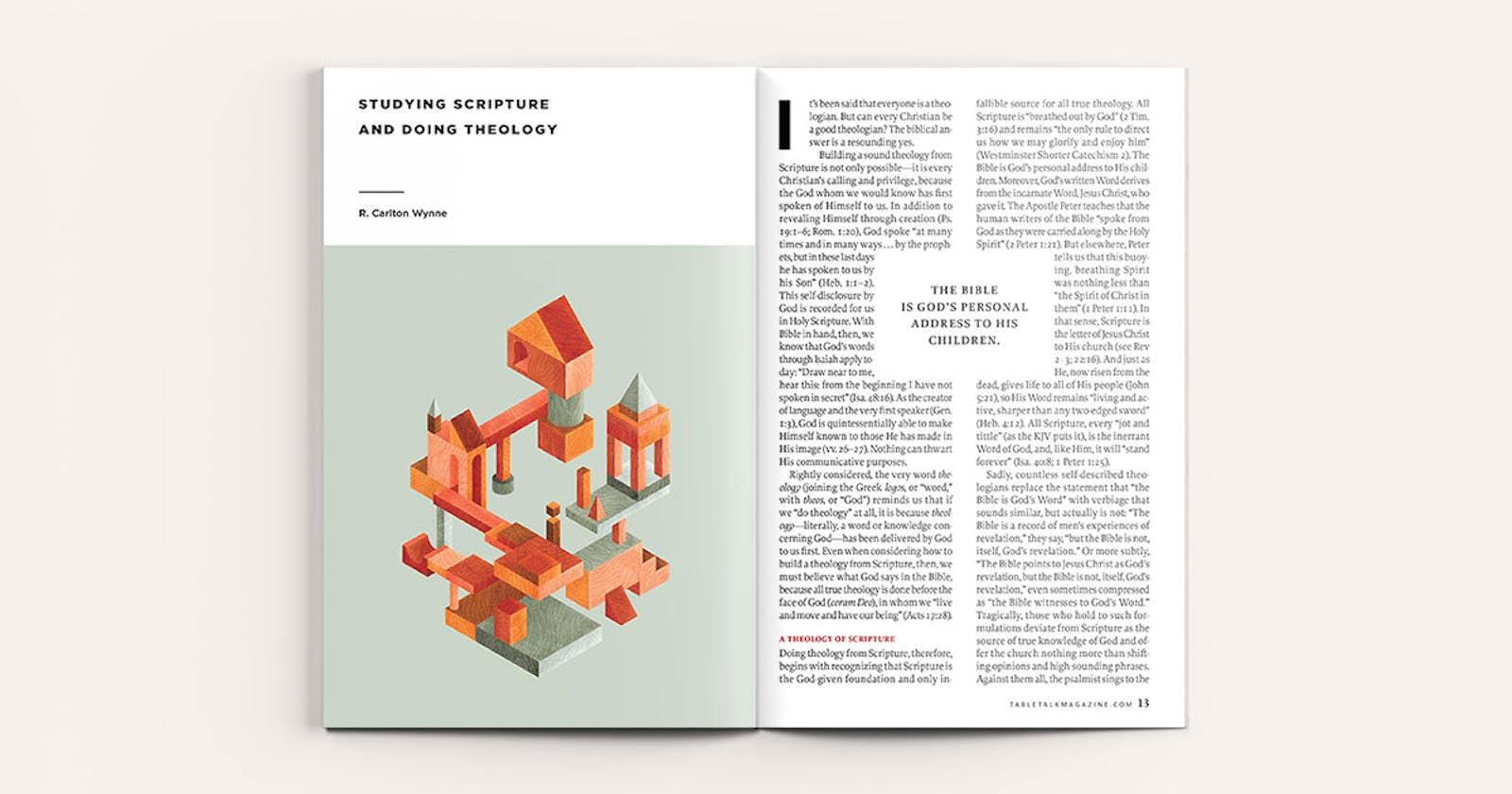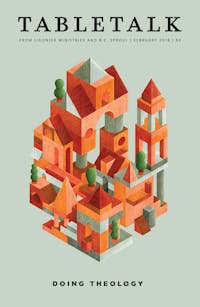
Request your free, three-month trial to Tabletalk magazine. You’ll receive the print issue monthly and gain immediate digital access to decades of archives. This trial is risk-free. No credit card required.
Try Tabletalk NowAlready receive Tabletalk magazine every month?
Verify your email address to gain unlimited access.
It’s been said that everyone is a theologian. But can every Christian be a good theologian? The biblical answer is a resounding yes.
Building a sound theology from Scripture is not only possible—it is every Christian’s calling and privilege, because the God whom we would know has first spoken of Himself to us. In addition to revealing Himself through creation (Ps. 19:1–6; Rom. 1:20), God spoke “at many times and in many ways . . . by the prophets, but in these last days he has spoken to us by his Son” (Heb. 1:1–2). This self-disclosure by God is recorded for us in Holy Scripture. With Bible in hand, then, we know that God’s words through Isaiah apply today: “Draw near to me, hear this: from the beginning I have not spoken in secret” (Isa. 48:16). As the creator of language and the very first speaker (Gen. 1:3), God is quintessentially able to make Himself known to those He has made in His image (vv. 26–27). Nothing can thwart His communicative purposes.
Rightly considered, the very word theology (joining the Greek logos, or “word,” with theos, or “God”) reminds us that if we “do theology” at all, it is because theology—literally, a word or knowledge concerning God—has been delivered by God to us first. Even when considering how to build a theology from Scripture, then, we must believe what God says in the Bible, because all true theology is done before the face of God (coram Deo), in whom we “live and move and have our being” (Acts 17:28).
A Theology of Scripture
Doing theology from Scripture, therefore, begins with recognizing that Scripture is the God-given foundation and only infallible source for all true theology. All Scripture is “breathed out by God” (2 Tim. 3:16) and remains “the only rule to direct us how we may glorify and enjoy him” (Westminster Shorter Catechism 2). The Bible is God’s personal address to His children. Moreover, God’s written Word derives from the incarnate Word, Jesus Christ, who gave it. The Apostle Peter teaches that the human writers of the Bible “spoke from God as they were carried along by the Holy Spirit” (2 Peter 1:21). But elsewhere, Peter tells us that this buoying, breathing Spirit was nothing less than “the Spirit of Christ in them” (1 Peter 1:11). In that sense, Scripture is the letter of Jesus Christ to His church (see Rev 2–3; 22:16). And just as He, now risen from the dead, gives life to all of His people (John 5:21), so His Word remains “living and active, sharper than any two-edged sword” (Heb. 4:12). All Scripture, every “jot and tittle” (as the KJV puts it), is the inerrant Word of God, and, like Him, it will “stand forever” (Isa. 40:8; 1 Peter 1:25).
Sadly, countless self-described theologians replace the statement that “the Bible is God’s Word” with verbiage that sounds similar, but actually is not: “The Bible is a record of men’s experiences of revelation,” they say, “but the Bible is not, itself, God’s revelation.” Or more subtly, “The Bible points to Jesus Christ as God’s revelation, but the Bible is not, itself, God’s revelation,” even sometimes compressed as “the Bible witnesses to God’s Word.” Tragically, those who hold to such formulations deviate from Scripture as the source of true knowledge of God and offer the church nothing more than shifting opinions and high-sounding phrases. Against them all, the psalmist sings to the Lord, “I have more understanding than all my teachers, for your testimonies are my meditation” (Ps. 119:99).
Doing Theology from Scripture
That said, how should Christians build their theology from Scripture? The answer lies in what prayerful, patient students of the Bible have done naturally for centuries, namely, not only paying careful attention to the meaning of particular passages in their immediate contexts, but also tracing organic connections with other passages across the whole of Scripture. In other words, doing theology from Scripture means weaving together the various strands of Christ-centered truth that the Bible organically unfolds for us. Because all of Scripture is from God, who is truth itself (Deut. 32:4; John 3:33), Scripture never contradicts itself. Moreover, the unity of Scripture demands that we see the whole Bible as the ultimate context of any single verse. Therefore, doing theology from Scripture centers on the question, what does the whole Bible say about God, man, sin, Christ, the church, heaven, or any other topic relevant to God’s Word? The infinite depth of Scripture leads us not only to explore what Scripture explicitly says, but also to trace the many truths that may be deduced from Scripture “by good and necessary consequence” (Westminster Confession of Faith 1.6)—such as the doctrine of the Trinity. As we study the Bible in this way, we enter more deeply into the revelation of God’s manifold wisdom (see Eph. 3:10).
Like the prayer that ought to fuel it, a systematic study of the Scriptures requires Spirit-wrought patience and perseverance. When we run into things that are “hard to understand” (2 Peter 3:16), we can and should look for help from godly teachers, Bible commentaries, and the wealth of the church’s past reflections on the Bible. After all, they, too, are Christ’s gifts to us (Eph. 4:11–14). But while such resources aid us in reading Scripture, our final authority must be the Spirit speaking in the Scriptures He inspired. When building a theology from the Bible, therefore, we do well to remember the key principle of interpretation championed by the Protestant Reformers (called the analogy of Scripture) and eloquently expressed in the Westminster Confession of Faith: “The infallible rule of interpretation of Scripture is the Scripture itself; and therefore, when there is a question about the true and full sense of any Scripture (which is not manifold, but one), it must be searched and known by other places that speak more clearly” (WCF 9.1). Much as one digs for a hidden treasure known to be there, those who faithfully study the Word gain an ever-enriching understanding of the only true God and the Savior He has sent (John 17:3), even as the Lord Jesus simultaneously transforms them to be more like Himself (2 Cor. 3:18).

As is God’s loving way, what He requires of us He is pleased to work in us (Phil. 2:12–13). Thus God, Himself, comes to our aid in studying Scripture. Jesus promised His Apostles that the “Spirit of truth” would guide them into all truth (John 16:13). How marvelous that the same Spirit who inspired the Scriptures indwells Christians and empowers our study of the Old and New Testaments “that we might understand the things freely given us by God” (1 Cor. 2:12). By divine grace, the serious inquirer of Scripture, earnest for the Spirit’s leading, taking full advantage of all the ways God blesses His church—including a weekly hearing of the preached Word, Christian fellowship, and prayer—will come to understand His Word and will bear much fruit (Matt. 13:23; Mark 4:20).
Bringing Our Theology to Scripture
The danger always lurks that we might unwittingly read into Scripture our own unbiblical biases. Sometimes we do eisegesis, reading things “into” (eis in the Greek) the text that are not there, rather than exegesis, reading the truth “out of” (ex in the Greek) the text. But just as God has overcome our sin through Christ (Rom. 5:15–17), so His Word is able to expose and correct the faulty assumptions we bring to it. Practically, then, we should not pretend that various assumptions do not inform our reading of Scripture. Instead, we should labor to form our assumptions from our careful reading of what Scripture says. In fact, striving to bring a studied, biblically grounded, theological framework to bear upon a text better enables us to recognize when a passage of Scripture does not “fit” with our prior assumptions, and that will prompt us to better align our thinking with Scripture. The result is a kind of “hermeneutical spiral,” a continual examination and evaluation of the theological perspective we have developed from our reading of Scripture, such that our theological perspective continually improves.
For example, a new Christian may have learned that Jesus died to take away sin (1 John 3:5). This knowledge, however limited it may be, becomes a grid through which he reads about the Jewish sacrifices described in the Old Testament. Suddenly, upon reading Hebrews 10:4 (“For it is impossible for the blood of bulls and goats to take away sins”), a new theological insight develops: the sacrifices in Israel anticipated the coming of Christ, who is the only effective sacrifice for sin (Heb. 7:27; 9:26). The Christian’s knowledge of Scripture thereby increases, and soon, John the Baptist’s declaration in John 1:29 (“Behold, the Lamb of God, who takes away sin of the world!”) sparkles on the page with a newfound brilliance.
The Fruit of Theology from Scripture
If true theology is about the glorious God who gave us the Bible, then doing theology is a proper goal of all Bible reading. But God’s revelation has come to us for an even higher purpose, namely, that we might know God personally in Christ and worship Him in the bond of fellowship. Thankfully, God has wed these two goals together by sovereign design. As we read the Bible for the theology presented in it, our study will fuel true worship. And what God has joined together, let no one put asunder.
